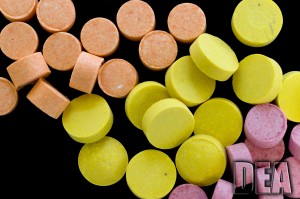 Classification: Hallucinogenic dissociative anesthetic
Classification: Hallucinogenic dissociative anesthetic
Commercial Names: Sernyl, Sernylan
Common Names/Nicknames: PCP, angel dust, T, PeaCe pill, boat, hog, love pill
Active Compound: 1-(1-phenylcyclohexyl)piperidine
Found in: PCP oil, PCP hydrochloride salt
Mode of Consumption: Ingestion, inhalation (smoking), insufflation
DEA Scheduling/Legal Status (in US): Schedule I (human use), illegal in all states. Schedule II (animal use), legal for veterinary purposes under strict regulation
Effects:
Hallucinogens, euphoria, dissociation, anesthesia, loss of coordination, loss of judgment, memory impairment drowsiness, slurred speech, hyperactivity, violence, aggression, coma, fatal overdose
Risks:
Accidental injury, psychosis, respiratory depression, hyperthermia, hypertension, coma, seizures, muscle damage, heart damage, kidney damage, liver damage. Some evidence for permanent brain damage
Dangerous Drug Combinations:
Potentially fatal mix with cocaine, amphetamine, and other stimulants. Potentially fatal combination with alcohol, barbiturates, methaqualone, benzodiazepines, and other drugs that suppress breathing. Possibly dangerous combination with antidepressants, ecstasy, and other drugs that affect serotonin levels.
Special Considerations:
While PCP carries relatively low risk of dependence, it does carry relatively high risk of harm and overdose. Its effects are similar to taking a combination of alcohol, amphetamine, hallucinogens, making it difficult to treat emergently.
And remember, if somebody may need help, play it safe and call for medical assistance.
“Students may bring an intoxicated or drug-impaired friend to University Health Services or to a hospital, or seek assistance from College residential life staff or HUPD, and by doing this, neither they nor the friend will face disciplinary action from the College for having used or provided alcohol or drugs.”
The Amnesty Policy
Harvard College Student Handbook
Sources:
Buzzed: The Straight Facts About the Most Used and Abused Drugs from Alcohol to Ecstasy (Third Edition), by Cynthia Kuhn, Scott Swartzwelder, and Wilkie Wilson. Published 2008 by W. W. Norton & Company.
National Institute on Drug Abuse (NIDA), part of the National Institute of Health (NIH) of the U.S. Department of Health and Human Services.
http://www.nida.nih.gov/DrugPages/
U.S. Drug Enforcement Agency (DEA), part of the U.S. Department of Justice.
Erowid Organization

